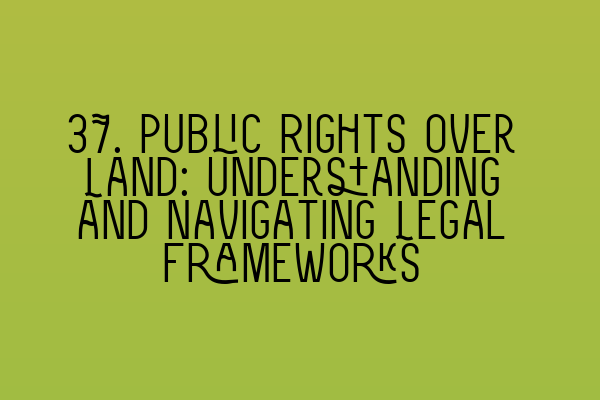37. Public Rights over Land: Understanding and Navigating Legal Frameworks
Welcome to the SQE Property Law & Land Law blog, where we provide valuable insights and guidance on various legal topics. In this post, we will delve into the complex area of public rights over land, helping you understand the legal frameworks involved and how to navigate them effectively. Whether you are a property owner, developer, or simply someone interested in land law, this post will serve as an essential resource.
Understanding Public Rights over Land
Public rights over land refer to the legal entitlements granted to members of the public to access or use land that is in private ownership. These rights can arise due to historical or customary use, statutory provisions, or through other legal mechanisms. It is crucial to have a comprehensive understanding of these rights to protect your interests and ensure compliance with the law.
There are various types of public rights over land, including:
- Right of Way: This allows individuals to pass over or through a particular piece of land to access another location. It is essential to establish the precise extent and conditions of the right of way to prevent disputes and avoid trespassing.
- Right to Light: This guarantees the right to receive natural light through windows or other openings in a building. It is crucial for property owners to consider potential light obstructions when undertaking construction or development projects.
- Right to Access Water: This pertains to individuals’ entitlement to access and use water bodies, such as rivers, lakes, or streams, for recreational or practical purposes. Companies or individuals looking to utilize water resources must understand and comply with relevant regulations.
- Right to Common Land: Common land is land owned by multiple individuals or communities, with specific rights and restrictions in place. Understanding the rights and obligations associated with common land is vital for landowners and developers.
Navigating the Legal Frameworks
When dealing with public rights over land, it is essential to consider the legal frameworks that govern these rights. The following are some key legal principles and statutes that you should be aware of:
- Common Law: Common law principles often form the foundation for public rights over land. Precedents set by court decisions shape the interpretation and application of these rights. Familiarizing yourself with relevant case law and legal principles is crucial for navigating this complex area.
- Statutory Provisions: Various statutes explicitly address public rights over land. The most notable in this context is the Land Registration Act 2002, which governs the registration and protection of property rights, including public rights. Understanding the specifics of these statutory provisions will help you protect your interests.
- Land Agreements: Many public rights over land are established through formal agreements between landowners and relevant authorities or communities. These agreements should be carefully drafted, considering both current and future rights and obligations.
In addition to understanding the legal frameworks, engaging the services of an experienced property law solicitor is highly recommended. A solicitor specializing in land law can provide expert advice and assistance tailored to your specific situation, ensuring that you navigate the complexities of public rights over land effectively.
Conclusion
Public rights over land can be intricate and nuanced, requiring a deep understanding of legal frameworks and principles. Whether you are considering land development, involved in disputes, or simply looking to protect your interests, it is crucial to stay informed and seek professional guidance when needed.
At SQE Property Law & Land Law, we offer comprehensive legal services related to public rights over land. Contact our team of solicitors today to discuss your specific requirements and explore how we can assist you. Don’t forget to check out the related articles below for further insights and resources:
